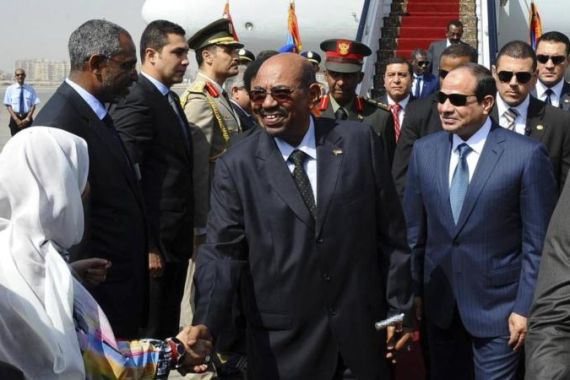Bashir’s calculated diplomatic dance
Sudan’s Bashir has been careful to travel only to countries that are not ICC members.

Sudanese President Omar al-Bashir has been unusually frenetic in recent weeks. He’s made official visits to both Saudi Arabia and Egypt, is currently hosting Libyan Prime Minister Abdullah al-Thani in Khartoum and has just been confirmed as his party’s candidate for next year’s presidential elections.
On the surface, these developments may appear to lend credence to Bashir’s assertion that Sudan’s isolation is coming to an end, particularly in the region. Sudan’s economy has been hard-hit by economic sanctions imposed by the US and others since as far back as 1997.
Keep reading
list of 4 itemsHow important is Captagon in al-Assad’s return to the Arab fold?
Assad gets warm reception as Syria welcomed back into Arab League
Will Syria’s return to Arab League usher in new era of stability?
But Bashir’s denial of any strategic relationship with fellow-pariah Iran, combined with Khartoum’s decision to close Iranian cultural centres in Sudan, ostensibly because they propagate Shiism, may signal an attempt to regain the favour of Sunni majority members of the Arab League, and to enhance confidence in Bashir’s avowals both to support the war against ISIL in the region, and to recognise and respect the elected Libyan leadership.
In return, Bashir will claim credit for breaking the isolation of Sudan within the Arab world, and far more importantly, he rests assured that none of his fellow leaders in the region will hand him over to the International Criminal Court (ICC), which issued a warrant in 2009 for his arrest for crimes against humanity during the conflict in Darfur, Sudan’s westernmost region. Indeed, while the ICC called on the Saudis to hand Bashir over during his October visit to Riyadh, it was always unlikely that they would comply, given that Saudi Arabia has not acceded to the Rome Statute which established the court.
Broken promise
Bashir’s opponents claim that the reason he reneged on his promise not to seek re-election after 25 years in power, is to continue evading the ICC using the pretext of presidential immunity. Bashir has been careful to travel only to countries that are not ICC states parties and has adroitly sidestepped invitations to regions whose support he is unsure of. Perhaps this is one reason why, despite its importance, Bashir elected to miss the IGAD (Intergovermental Authority on Development) summit held in the South Sudanese capital, Juba, last week.
|
|
| Sudan marks 25 years of Bashir rule |
Strategically, Bashir’s visit to Egypt may be even more crucial than his sojourn in Riyadh, given that Bashir’s National Congress Party (NCP) government is ideologically aligned with Egypt’s Muslim Brotherhood, who were ousted by the current Cairo regime in June 2013.
Despite the commitment by Cairo and Khartoum to work towards peace and stability for their mutual neighbour, Libya, they have had a long-standing border dispute and a more recent disagreement over the Ethiopia dam and hydro-power plant, which Egypt believes will have a detrimental impact on its water supply.
Khartoum’s previous relations with both Riyadh and Cairo have been strained partly because of the long-standing regional rivalry between Iran and Saudi Arabia, and Khartoum’s seeming support for Tehran. Iranian ships utilise Port Sudan and Iran has reportedly supplied military equipment to Sudan for its civil wars in the south and west, with Khartoum also being accused of acting as an arms conduit to Palestinian group Hamas. In Darfur alone, the UN places the death toll at around 300,000, with millions more displaced, though Khartoum continues to insist that there were only 10,000 fatalities in the Darfur uprising.
Since both the House of Saud and the Sisi leadership in Egypt have also been anxious to maintain ties with their western allies and to maintain an appropriate distance from Tehran, Bashir’s dance towards detente with both regimes is all the more surprising.
Return to cordiality
Internally, there has been an unprecedented return to cordiality between Bashir and fellow political leader Hasan al-Turabi, who made his first appearance at NCP headquarters in 15 years. But Sudanese opposition parties have condemned Bashir’s confirmation as the NCP’s presidential candidate, with most characterising the move as an attempt to avoid the Hague court. The National Umma Party’s Sadik al-Mahdi said: “Bashir’s candidacy is an error … constitutionally, politically, economically, and internationally.”
The Communist Party’s spokesperson told a Sudanese radio station that the nomination would complicate the crises in Sudan and the Sudanese Congress Party said that it showed the NCP does not respect democracy.
The Sudan Revolutionary Forces (SRF), an umbrella group of so-called rebel formations from Darfur and the contested border areas of Kordofan and Blue Nile, has characterised the move as a tragedy and a harbinger of failure for the national dialogue process. SRF Deputy Chairperson al-Tim Hago asserted that the NCP placed Bashir’s personal safety above the national interest and the needs of the people, since Bashir cannot adequately carry out diplomatic tasks with the ICC indictment hanging over him. Hago added that the country’s economy and social fabric were being destroyed as a result.
At both domestic and international levels, Bashir’s recent moves have given rise to controversy and speculation. It remains to be seen whether he can continue his tightrope act of evading the Hague court, while avoiding conflict over water resources with his neighbours and maintaining the confidence of both the Sudanese electorate and his current detente with other Arab leaders.
Ayesha Kajee is a human rights activist and political analyst with a special focus on African governance and development. She tracks elections and democratic consolidation in the region.
